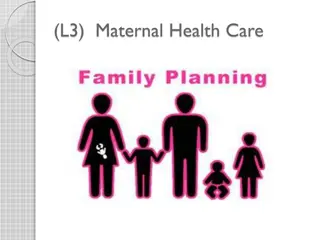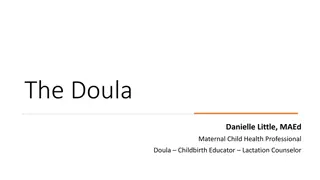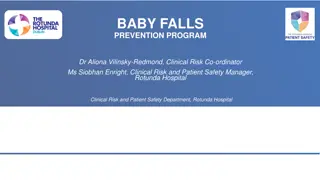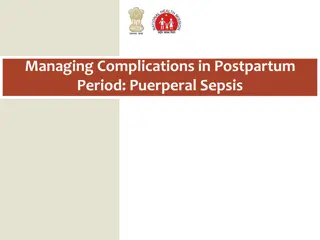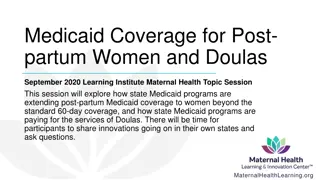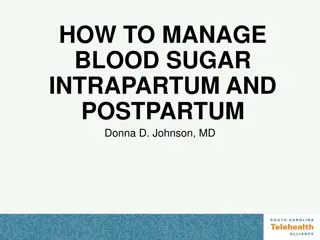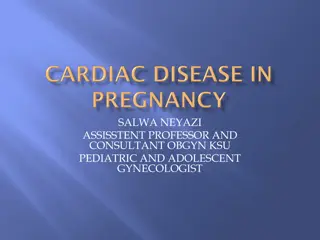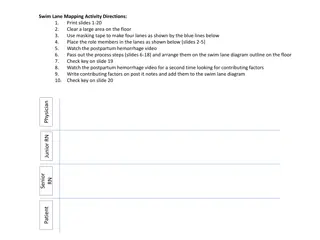Understanding Postpartum and Baby Blues: Education and Support
Providing new moms with essential information on postpartum adjustment, baby blues, and available resources to cope with challenges. Session goals include establishing a supportive relationship, setting realistic expectations, and introducing role transitions. Expectations, views on motherhood, and psychoeducation on baby blues are covered to normalize experiences and offer practical help.
Download Presentation

Please find below an Image/Link to download the presentation.
The content on the website is provided AS IS for your information and personal use only. It may not be sold, licensed, or shared on other websites without obtaining consent from the author. Download presentation by click this link. If you encounter any issues during the download, it is possible that the publisher has removed the file from their server.
E N D
Presentation Transcript
Session A: Education Common Complaints From New Moms Baby Blues Postpartum Depression Where to get Help Resources 1
Session A Goals Establish a working relationship Setting realistic expectations about the postpartum period + motherhood Introduce the concept of role transition Introduce the concept of utilizing social support Provide woman with an overview of the course 2
Session A Setting Expectations Ground rules Confidentiality (limits of confidentiality), being supportive to one another, encouraging participation, time management, management of cell phones Description of group Classes (not treatment), skill based, focused on postpartum stress management, session times, cancellations, children at groups Introductions Interventionist, group members (name, number weeks pregnant, delivered before, etc) 3
Setting Expectations If you provide care to patient, it will be important to provide a context for why you are now talking about ways to cope once the patient has had her baby. Here at (name of clinic) we are committed to helping mothers get a good start for their babies. Happy moms , happy babies. When we meet I will (also) be talking with you about the changes and stresses that can occur once you have had your baby and ways you can manage these changes. or Becoming a mother brings about many changes and in our ROSE classes we will provide you with tools (a toolkit) to successfully survive motherhood. 4
Session A Views on Motherhood Current expectations Society s expectations from media (e.g., Facebook) etc., stories heard from woman s own mom, sisters, friends, own story/expectations, different experiences among women Reality of having a baby Hardest job, little training, sleep deprivation etc. 5
Session A Psychoeducation Create realistic expectations around the postpartum period Adapt information based on woman s experiences (emphasize individual differences) Normalize experiences Review resources and how to access them (informal sources of support) 6
Session A Psychoeducation on Baby Blues Range of responses among women after delivery Most mothers get baby blues up to 80% Description of baby blues (mood swings, crying for no reason) Refer to handouts on Common Complaints and on Baby Blues 7
Common Complaints From New Moms The new demands, challenges and pressures of motherhood can leave you feeling overwhelmed. Here are some common complaints of new moms: I can t feel anything I am irritable I can t sleep I have no interest in normal activities I feel so nervous I feel so guilty I can t get going I feel so tired I can t stop eating 8
Baby Blues 30-80% of women experience Baby Blues It usually occurs 2-5 days after delivery and usually goes away after about two weeks Crying Mood swings Exhaustion Tension Anxiety Restlessness 9
Session A Psychoeducation on Postpartum Depression Ask women if they know the symptoms of postpartum depression or depression, % of women who get it For women who have financial difficulties about one in four to five women will experience postpartum depression Refer to handout on postpartum depression Women who have had previous episode/s of depression are more likely to experience depression after childbirth. Those women who have had postpartum depression are more likely to experience it again 10
Postpartum Depression Sleep problems (example: you cannot return to sleep after feeding the baby) Eating problems-eating too much or too little Anxiety and worry Avoiding people, avoiding contact with the baby, wanting to be on your own No energy Death wish, suicidal thoughts Difficulty having positive feelings towards the baby Difficulty making decisions Mania-feeling speedy, being excitable and irritable, talking fast, and having less need for sleep Panic attacks Fears for the baby, fantasies about harming or killing the baby If you ever feel that you might hurt yourself, your baby or anyone else, please talk to your healthcare provider or call 911 11
Session A Importance of Seeking Support Can feel better talking to support people Support can help prevent postpartum depression New moms deserve support Treatment can help Review where to get help handout Review local resources Normalize negative postpartum feelings. Refer to handout you are not alone, you are not to blame, and you can feel better 12
You are not alone You are not to blame And YouCAN feel better 13
Where to get Help? YOU ARE NOT ALONE! HELP IS AVAILABLE! 1. A few hours of weekly childcare can give you a much needed break. Sharing feelings openly allows family & friends to provide support. LEAN ON FAMILY AND FRIENDS 2. TALK TO A HEALTH CARE PROFESSIONAL Doctors will know what options are available to you for assistance and will be familiar with perinatal depression. 3. FIND A SUPPORT GROUP There are women in your community suffering in similar situations; sharing your feelings with a group of women experiencing the same thing can be helpful. Talk to your health care provider about how to join a group. 4. TALK TO A MENTAL HEALTH CARE PROFESSIONAL Mental health care professionals can give you a safe place to express your feelings and will be useful in assisting with management of your symptoms. 5. FOCUS ON WELLNESS Eat a healthy variety of colorful foods, healthy snacks, and avoid alcohol use. Exercise, invite friends to go on walks, try a new activity, take time to stretch muscles. 14
My Resources Parenting _________________ _________________ _________________ _________________ _________________ _________________ _________________ Mental Health _________________ _________________ _________________ _________________ _________________ _________________ _________________ Suicide Prevention __________________ __________________ __________________ __________________ __________________ __________________ __________________ Legal Services __________________ __________________ __________________ __________________ __________________ __________________ __________________ Domestic Violence _________________ _________________ _________________ _________________ _________________ _________________ _________________ 15
Wrapup Having a baby is a major life event New demands and new skills will be needed Postpartum women deserve positive support Reemphasize the importance of support (a buffer for PPD) Date and time of next session Preview of next session (Ways to decrease stress, how to survive motherhood, and talk about support people in your life) 16
Potential Difficulties Session A Woman strays off the topic/talks too much Acknowledge feeling/thought/concern Redirect (politely and carefully-validate her) I know these concerns are really important to you, but I am going to have to move on because we have still so much material to talk about and I want to make sure I share with you some important information Use close-ended questions Offer to speak to her after the session 17
Potential Difficulties Session A Women engage in side conversations with one another Emphasize importance of social support. Pleased to see them connect Ask if possible to continue after group, exchange contact information Remind class and lots to share with them 18
Potential Difficulties Session A Woman reticent to participate Reassurance, normalization, encouragement (reinforce any response), gentle probes on nonthreatening material, open-ended questions (e.g. What did you think of that?) 19
Potential Difficulties Session A Women become restless Take a stretch break; Take a snack break; Take a deep breath-in and -out break; Take a massage hands with cream break; Acknowledge that group is long and let them know more or less how much of session is left. 20



